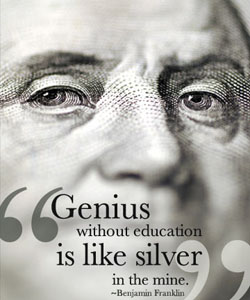Benjamin Franklin's Education
|
| updated |
Copy Link Code
|
 By the time of his participation in the movement for American Independence, Benjamin Franklin was considered by many to be the most profound polymath on the continent. As a printer, publisher, writer, scientist, inventor, postmaster, politician and diplomat, Franklin had a track record of genius innovation and great sensibility. Because he did earn honorary degrees from such prestigious universities as William & Mary, St. Andrews and Oxford, many people referred to him as Dr. Benjamin Franklin. However, this most illuminated of men had ceased his formal education at the age of 11 due to a lack of family funds. For Benjamin Franklin, education was mostly a personal endeavor and he proved to be a voracious learner on his own accord. Franklin was inspired by the philosophers of the Enlightenment as well as scientific advances that were constantly challenging the contemporary concept of natural law. He could not help but get involved in the debates on religion, society, and science that were swirling around him and his contributions were widely celebrated and criticized by few.
By the time of his participation in the movement for American Independence, Benjamin Franklin was considered by many to be the most profound polymath on the continent. As a printer, publisher, writer, scientist, inventor, postmaster, politician and diplomat, Franklin had a track record of genius innovation and great sensibility. Because he did earn honorary degrees from such prestigious universities as William & Mary, St. Andrews and Oxford, many people referred to him as Dr. Benjamin Franklin. However, this most illuminated of men had ceased his formal education at the age of 11 due to a lack of family funds. For Benjamin Franklin, education was mostly a personal endeavor and he proved to be a voracious learner on his own accord. Franklin was inspired by the philosophers of the Enlightenment as well as scientific advances that were constantly challenging the contemporary concept of natural law. He could not help but get involved in the debates on religion, society, and science that were swirling around him and his contributions were widely celebrated and criticized by few.
In 1747, Franklin began to organize a proposal for education of youth in Pennsylvania. His efforts led to the opening of the Academy and College of Philadelphia in 1751. Forty years later, the school would combine with the University of the State of Pennsylvania to become the University of Pennsylvania, an academic powerhouse to this day. Franklin was not necessarily in favor of a traditional education and hoped that his academy could serve as a leader in new methods of student-led experiments and learning through individual experience. Despite his busy schedule as the owner of a newspaper and Postmaster of Philadelphia, Franklin continued his own self-education in his spare time. In 1752, Franklin's experiments on lightning caught the attention of scientists and laymen around the world. In fact, Franklin was invited to the court of the King of France to share his electric experiments and discuss his view of future possibilities involving electricity. The honorary degrees he received for his contributions to education and science only confirmed the years of reading, writing and inventing in Franklin's life.
For Ben Franklin, education was an lifelong mission. Inventions he crafted later in life demonstrate his commitment to stay up to date and continue his favorite pastime of reading. The special glasses he had made, which he called "double spectacles" would be known as bifocals today. These lenses allowed Franklin, who had notoriously poor vision, to read at any time and still see at long distances without having to constantly switch out his glasses. For even more convenience and time-saving purposes, Franklin put together a rotating library chair that allowed him to swivel between his desk and bookshelf. To reach the higher shelves of books in his home, the elder Franklin invented a mechanical extension arm. When Franklin passed away in 1790, his will granted 1,000 pounds each to Pennsylvania and Massachusetts to be kept in a trust and left untouched for 200 years. When the money became available, much of it went to academic scholarships for disadvantaged youth.
